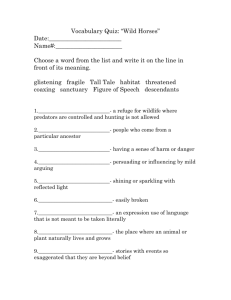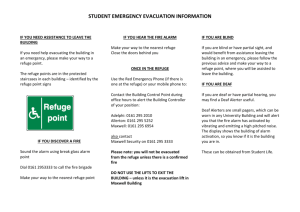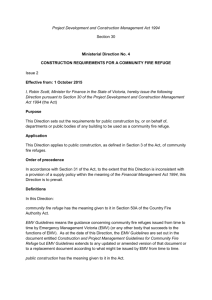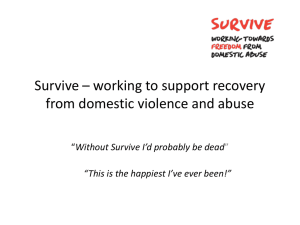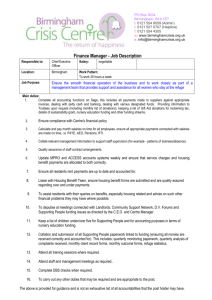Forced Marriage Civil Protection Bill.doc
advertisement
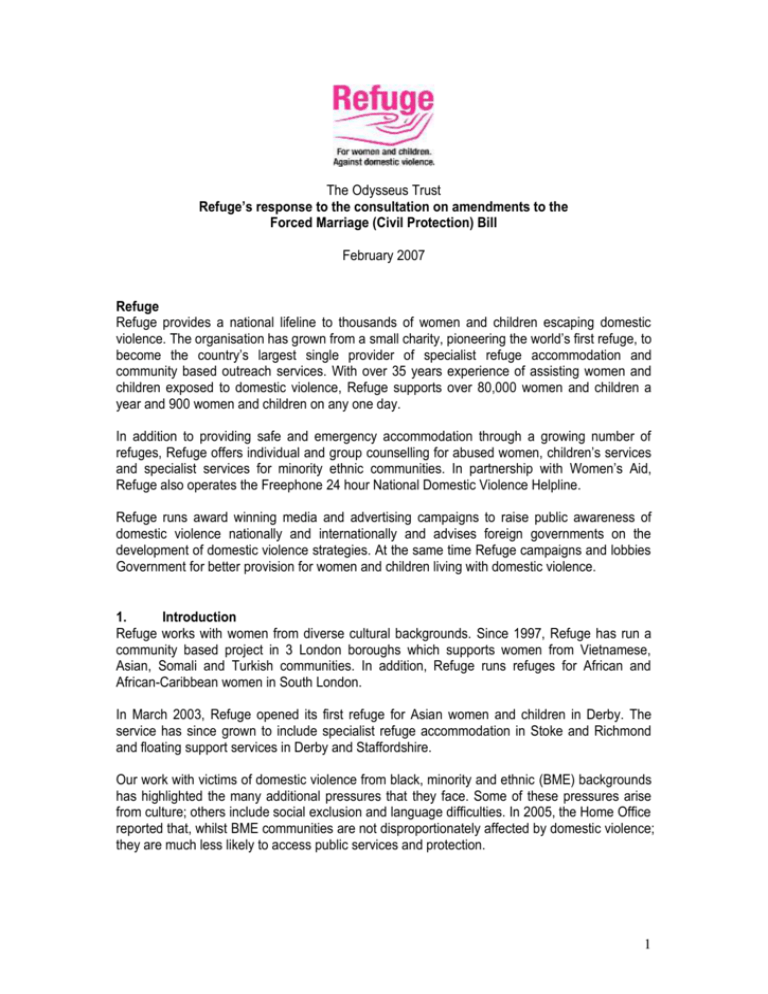
The Odysseus Trust Refuge’s response to the consultation on amendments to the Forced Marriage (Civil Protection) Bill February 2007 Refuge Refuge provides a national lifeline to thousands of women and children escaping domestic violence. The organisation has grown from a small charity, pioneering the world’s first refuge, to become the country’s largest single provider of specialist refuge accommodation and community based outreach services. With over 35 years experience of assisting women and children exposed to domestic violence, Refuge supports over 80,000 women and children a year and 900 women and children on any one day. In addition to providing safe and emergency accommodation through a growing number of refuges, Refuge offers individual and group counselling for abused women, children’s services and specialist services for minority ethnic communities. In partnership with Women’s Aid, Refuge also operates the Freephone 24 hour National Domestic Violence Helpline. Refuge runs award winning media and advertising campaigns to raise public awareness of domestic violence nationally and internationally and advises foreign governments on the development of domestic violence strategies. At the same time Refuge campaigns and lobbies Government for better provision for women and children living with domestic violence. 1. Introduction Refuge works with women from diverse cultural backgrounds. Since 1997, Refuge has run a community based project in 3 London boroughs which supports women from Vietnamese, Asian, Somali and Turkish communities. In addition, Refuge runs refuges for African and African-Caribbean women in South London. In March 2003, Refuge opened its first refuge for Asian women and children in Derby. The service has since grown to include specialist refuge accommodation in Stoke and Richmond and floating support services in Derby and Staffordshire. Our work with victims of domestic violence from black, minority and ethnic (BME) backgrounds has highlighted the many additional pressures that they face. Some of these pressures arise from culture; others include social exclusion and language difficulties. In 2005, the Home Office reported that, whilst BME communities are not disproportionately affected by domestic violence; they are much less likely to access public services and protection. 1 On average, Refuge receives approximately 40 calls a month from women experiencing forced marriage. Yet, because many women are reluctant to come forward, we know that this figure is not a true reflection of the scale of the problem. 2. Background Refuge responded to the Foreign and Commonwealth Office (FCO) consultation ‘A Wrong not a Right’ in January 2006. We welcomed the Government’s commitment to addressing forced marriage and acknowledged that forced marriage is a serious crime which requires state intervention. Like the Government, Refuge recognised that the debate around criminalising forced marriage is extremely complex. Consultation with staff, women in refuges, women accessing community support groups and drop-in centres and women accessing one-to-one support services revealed a mixed reaction to criminalising forced marriage. However, the over-riding feedback was that respondents wanted the current laws to be better understood and adopted by professionals. Respondents also agreed that a greater understanding of forced marriage within communities as well as an awareness that it is against the law would provide women with more tools with which to negotiate. Refuge therefore supported the view expressed in Southall Black Sister’s response to the FCO and stated that it is not necessary to create a separate criminal offence of forced marriage. Existing legislation, if properly implemented, would be as effective as primary legislation. Refuge also supported Southall Black Sister’s recommendation that the Government ‘address civil law, access to legal aid, provision of alternative safe and secure housing, financial support and increased awareness in schools as some alternative means by which to signal to society that forced marriage is a crime’. Following the Government’s decision not to criminalise forced marriage, Refuge offered the FCO assistance in taking forward its non-legislative activities. This has included facilitating a review of the FCO’s ‘survivor’s handbook on forced marriage’ by a group of residents who are part of Refuge’s Asian Women’s Project in Richmond. 3. Response to consultation questions Refuge believes that domestic violence and other forms of violence against women will only be effectively addressed when the Government complies with its responsibility under the 1995 UN Beijing Platform for Action (1995) and puts in place a fully funded national ‘violence against women’ strategy. In the same way that domestic violence must be addressed through a three-pronged approach of protection, prevention and provision – so must forced marriage. To this end, Refuge’s response to the consultation questions is clustered around these three areas: 3.1 Protection Refuge welcomes the protective aim of the Forced Marriage (Civil Protection) Bill. Yet at the same time, Refuge notes that a number of the protective mechanisms proposed in the Bill are already provided through the Family Law Act (1996). Indeed, Refuge’s own experience of supporting women affected by forced marriage involves helping victims successfully apply for injunctions under the 1996 Act when they choose to do so. 2 Whilst a free standing act might be easier for victims to use and understand, what is most important is that professionals are able to identify and effectively direct victims to appropriate remedies. Resources need to be made available to provide mandatory forced marriage training (as part of wider domestic violence training) for all professionals including agencies such as the police, the judiciary, CAFCASS, social services and educational establishments. As such, Refuge agrees that the guidance on forced marriage produced by the Forced Marriage Unit for police, educational professionals and social services (as well as that currently being produced for registrars and health services) should be put on a statutory footing. Refuge also suggests that guidance should be produced for immigration officials, educational establishments, housing officials, local authorities generally and the different parts of the judiciary. Refuge recommends that compliance with the guidance should be monitored in order to identify and address any gaps that may exist. Consultation with refuge residents indicates that the guidance should certainly include the difference between forced and arranged marriage, but also recognition that emotional force and duress are used as tools to ‘assist’ an ‘arranged’ marriage. For this reason, Refuge is pleased to note that the definition of forced marriage (within the explanatory notes to the Bill) recognises psychological (as well as physical) coercion. 3.2 Prevention Again, Refuge welcomes the preventative aspect of the proposed Bill which would have some deterrence value. However forced marriage, like violence against women, will only end when the whole of society recognises that it is wrong. Women consulted by Refuge believe that it is possible to address the attitudes of younger people, but express concern about how to reach out to older generations. An extensive and long term forced marriage prevention and education campaign is required in order to meet this objective. Refuge recommends that raising awareness of forced marriage as a crime must permeate throughout society. Prevention and education campaigns must be multi-tiered and challenge society’s response to the many forms of violence against women, beliefs within communities where forced marriage is perpetrated and attitudes within families. Alongside addressing the public’s attitude, it is essential that violence against women becomes a core part of the national curriculum. Children of all ages and backgrounds must learn from an early age that forced marriage is against the law and that all forms of violence are an abuse of human rights. In addition, teachers should undergo appropriate training as part of their Post Graduate Certificate in Education (PGCE) training. It is vital that teachers understand the roots of forced marriage, the prevalence, the myths and how to pick up on signs that a forced marriage might be imminent. Teachers must also be aware of services and help available to young women. 3.3 Provision Refuge recognises that the Forced Marriage (Civil Protection) Bill will raise awareness of forced marriage and challenge social attitudes. In doing so, it will also create an expectation within communities that support services are available. Furthermore, some women may find themselves ostracised by their family and community by taking civil action against them. 3 It is, therefore, vital that women experiencing forced marriage have sufficient access to refuge accommodation, access to specialist BME advocates and access to support groups. However there is currently a shortage of generic support services for women meaning that specialist support services fare even worse. Furthermore, implications such as the ‘no recourse to public funds’ rule make accessing services for black, minority and ethnic women harder still. This is because women without indefinite leave to remain in the UK are unable to access state funding when they leave a violent partner. 3.4 Funding Refuge recommends that the Bill contains a specific provision about legal aid. The cost of an injunction is beyond the remit of most vulnerable individuals and is an impossible cost for women who have no recourse to public funds. 3.5 Monitoring the Bill Refuge further recommends that there is a proviso in the Bill to say that it will be monitored and evaluated. BME women are often disempowered from legal processes with decisions made by professionals; therefore evaluation and monitoring will be a key activity in order to see how the Bill is being used and experienced by victims. 4
